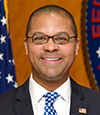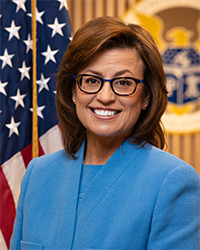FCC Commissioners Again Plead for Additional ACP Funding
Thursday, March 14, 2024
Digital Beat
FCC Commissioners Again Plead for Additional ACP Funding
On March 14, the Federal Communications Commission adopted its annual assessment of whether broadband is being deployed in a reasonable and timely fashion. In addition to considering deployment of physical broadband networks, the FCC also examined broadband affordability, adoption, availability, and equitable access to determine whether broadband is being deployed in a reasonable and timely fashion to “all Americans.” In their remarks explaining their support for adopting the report, FCC Commissioners Geoffrey Starks and Anna Gomez mentioned the wind down of the Affordable Connectivity Program (ACP), the largest and most successful broadband affordability effort in U.S. history. As Congress considers providing additional support for ACP, the program is expected to run out of funding in the coming weeks.

"There remains much work to be done to close the digital divide," Commissioner Starks began. "One of those challenges is affordability. I want to focus, specifically, on this account because our ability to solve this aspect of the digital divide is in grave peril. I’m talking about the lack of funding for the Affordable Connectivity Program. Over 23 million American households have relied on the ACP to subscribe to broadband. These households will soon confront a hard choice between bill shock and disconnection. We should not let that happen.
"ACP has had a significant impact nationwide. Americans throughout the country enroll—in urban, rural, and Tribal communities. At the time of the ACP enrollment freeze last month, over 130,000 households in my home state of Kansas were enrolled, over 1,707,000 in Florida, 186,000 in Connecticut, and 470,000 in Virginia, the home states of my colleagues. Over 329,000 Tribal households were enrolled, and notably ACP has surpassed expectations for rural enrollment.
"ACP enrollees include young learners, grandparents, and everyone in between. To put it plainly, ACP is the most effective program we’ve ever had in helping low-income Americans get online and stay online. Those benefits are in jeopardy because we recently announced that April will be the last fully funded month in the Program. That means without additional funding from Congress, millions of Americans will lose access to affordable broadband. Millions of low-income American households will face monthly Internet bills that will skyrocket, and I fear many will be unable to remain connected. This fear is supported by data the Commission recently released. 77 percent of recent survey respondents said that losing their ACP benefit would disrupt their service by making them change their plan or drop service entirely. Nationwide, 49 percent of ACP households are subscription vulnerable, meaning that they find the Internet very difficult to fit into their monthly budgets and are constantly on the edge of disconnection. 68 percent of ACP households reported that they had inconsistent or zero connectivity prior to ACP, and 80 percent cited affordability as the reason for this lack of connectivity. I have heard directly from people about how having access to affordable, high-quality broadband has impacted their lives, and what the risk of losing access could mean. But, don’t take my word for it. Let me share one story with you.
"I met Debra, a dynamic grandmother, when I was recently in Illinois to discuss ACP. She is currently receiving federal housing assistance and moved to Lake County, an hour away from her family and church community. She told me that, thanks to ACP, she’s “hooked” on the Internet. She goes to church online every Sunday and speaks to her grandchildren and family once a week. She is taking advantage of her Internet connection to use MapQuest and explore her new community. She also started a knitting business online, and she told me when I met her just after Valentine’s Day last month that she has joined an online dating site for seniors. I wished her luck. When we discussed the potential end of the program, she asked me, 'What am I going to have to give up to keep what you’ve put in my life? Maybe eat less food?'
"The lack of an affordability program also risks harming the biggest investment the country has ever made in broadband infrastructure deployment, the Broadband Equity Access and Deployment Program (BEAD). Without ACP, BEAD’s $42.5 billion to deploy broadband networks to reach millions of unserved and underserved communities, primarily in rural communities, will not reach as far as it could. ACP makes building out to these rural homes less risky and less expensive, because more of the serviceable population can afford to subscribe. Indeed, a recent study concluded that ACP reduces the subsidy needed to incentivize building in rural areas by a whopping 25 percent. With ACP, states can stretch their BEAD dollars farther and can connect some of the 24 million Americans identified in our section 706 Report.
"I’m an optimist, so I remain hopeful that Congress will fund ACP going forward. And there is reason for hope. President Biden has asked Congress to fund ACP as part of his budget, and recently called again on Congress to extend its funding. There is a bipartisan, bicameral effort to fund ACP – the Affordable Connectivity Program Extension Act, which I am proud to strongly support. Additionally, nearly 400 other government leaders, industry, and public interest groups support the Extension Act as well. At the state and local level, 26 bipartisan governors and 174 mayors have urged Congress to act. I stand ready and willing to do whatever it takes to make sure that these Congressional proposals bear fruit, so that next year when we adopt our 2025 section 706 Report, we can highlight that the availability of advanced telecommunications capability to all Americans has improved because Americans continue to have access to affordable broadband."

Speaking after Starks, Commissioner Gomez said, "Today’s Report finds that 24 million Americans lack access to fixed broadband connectivity. More must be done to ensure that broadband is being reasonably and timely deployed to all Americans, and partcularly those that have been historically underserved—consumers who live in rural, tribal, and low-income communities. More must also be done to ensure that when broadband is deployed, that it affordable to consumers. Ensuring connectivity is affordable will ensure that once deployed, networks can be sustained.
"Unfortunately, one of the FCC’s greatest tools to closing the digital divide and supporting connectivity, the Affordable Connectivity Program (ACP), will end next month. For low-income rural Americans, the ACP has been a lifeline to ensuring they have access to connectivity. For rural Americans who are yet to be served, the end of ACP means that the Broadband, Equity, Access Deployment (BEAD) Program’s $42.5 billion investment in broadband infrastructure may not reach them. These rural consumers have been waiting for connectivity to finally come to them—but may be disappointed when the buildout does not go as far as expected.
"We’ve made so much progress. But as today’s Report finds, more must be done. The ACP is a key tool that is necessary to continue our progress to connectivity everyone everywhere, particularly, those in rural and hard to reach areas."
The Benton Institute for Broadband & Society is a non-profit organization dedicated to ensuring that all people in the U.S. have access to competitive, High-Performance Broadband regardless of where they live or who they are. We believe communication policy - rooted in the values of access, equity, and diversity - has the power to deliver new opportunities and strengthen communities.
© Benton Institute for Broadband & Society 2023. Redistribution of this email publication - both internally and externally - is encouraged if it includes this copyright statement.
For subscribe/unsubscribe info, please email headlinesATbentonDOTorg






